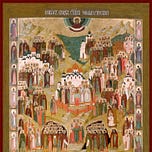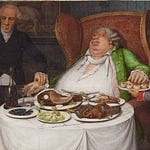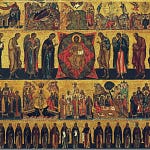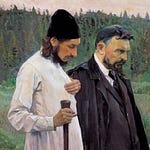Today, on the second Sunday after Pentecost, we continue to explore the meaning of sanctity in our lives through the examples provided to us by the Church. The Church guides us in the celebration of the memory of the saints who are the closest to us in culture and often in time. The numerous holy princes and peasants, learned and simple, monastics and soldiers, hermits and martyrs, men, women, and children - they are our ancestors and neighbors, parents and children, past, present, and future. Sanctity in the holy Church of Christ did not end in some long-ago century but has always persevered and is set as a standard for our own lives here and now. Sanctity did not stop with the Apostles in the first century, or the Fathers in the next few centuries, or even the New Martyrs of Russia in the 20th century, but also shines in the lives of the saints here in North America even until this day. And those who personally remember, for example, the life of Saint John of San Francisco, know that sanctity is not in spectacular fireworks or drumbeat from the sky, but in taking one’s cross and following Christ (Matt. 10:38).
In the Gospel reading for the memory of the saints, we hear about the strange beatitudes or qualities that make people blessed in the eyes of God (Matt. 5:1-12). They are the blessed qualities that shine forth through the lives of saints, but how unusual they are in the eyes of the secular world! Christ says: “Blessed are the poor in spirit” (3), but it is the rich and the arrogant who are adored by the world. “Blessed are those who mourn” (4), but the world urges us not to think about death, to forget that this earthly life has a purpose and an end, and to pursue happiness instead - just do it, you deserve it. “Blessed are the meek” (5), but it is the ruthless that get ahead in the world, and it is through brutality that earthly kingdoms are established. “Blessed are those who hunger and thirst for righteousness” (6), but the world wants us to hunger and thirst for very different things - the world does not want us to be righteous, it wants us to be consumers. “Blessed are the merciful” (7), but secular schools teach the doctrine of the survival of the fittest - a cut-throat competition in which mercy has no place. “Blessed are the pure in heart” (8), but purity is mocked and trampled into dirt in today’s society, and perversion is celebrated. “Blessed are the peacemakers” (9), but the secular definition of peacemaking is a complete reversal of peace: start a preemptive war, strike first, and kill first - igitur quī dēsīderat pācem, præparet bellum. This is not true peace, not Christ’s peace (Jn 14:27). “Blessed are those who are persecuted for righteousness’ sake” (10), but the world persecutes righteousness and those who seek it and leaves no place for it as it marches along the path of “social progress.” Blessed are those who are persecuted for Christ (11), but who are the persecutors? In ancient Israel, they were the leaders of the people. In ancient Rome, they were the best emperors. And in Russia, those who envisioned a “bright future” for all, slaughtered hundreds of thousands of clergy and millions of the faithful on the altar of their delusion. We must remember this fact whenever we feel comfortable in this world, whenever the world seems to be our friend. “Do you not know that friendship with the world is enmity with God? Therefore whoever wishes to be a friend of the world makes himself an enemy of God” (Jas. 4:4).
Listen to this episode with a 7-day free trial
Subscribe to Phroneo to listen to this post and get 7 days of free access to the full post archives.












